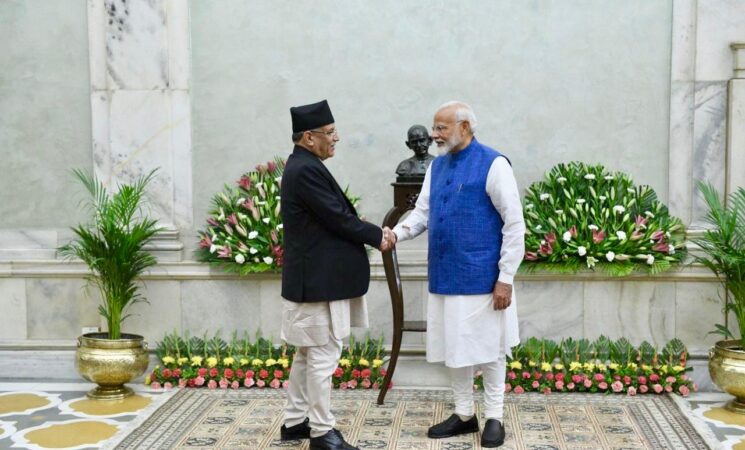16th June 2024 NIICE Commentary 9240
Aditi Bhatt
The 2024 Indian general elections have concluded with the National Democratic Alliance (NDA), led by the Bharatiya Janata Party (BJP) under Prime Minister Narendra Modi, securing a decisive victory. Modi's third term, often referred to as “Modi 3.0”, is set to continue shaping India's foreign policy and its relationships with neighboring countries, including Nepal. This article delves into the implications of the 2024 Indian election results for Nepal's political landscape and foreign policy.
Continuity in India-Nepal Relations
One of the primary expectations from Modi's third term is continuity in the policies that have characterized India-Nepal relations over the past decade. Modi's tenure has seen efforts to strengthen ties between the two countries through various means, including infrastructural projects, economic assistance, and cultural diplomacy. The emphasis on “Neighborhood First” policy is likely to persist, with Nepal being a significant focus.
Economic and Infrastructural Cooperation
Economic cooperation is a cornerstone of India-Nepal relations. Modi's previous terms witnessed the implementation of several key projects, such as the Motihari-Amlekhgunj petroleum pipeline and the Janakpur-Jayanagar railway line, which have had significant positive impacts on Nepal's economy and connectivity. Modi 3.0 is expected to continue these infrastructural initiatives, potentially expanding them to new areas such as renewable energy, road networks, and digital connectivity.
Political Stability and Regional Dynamics
Nepal's political landscape has been characterized by frequent changes in government and political instability. A stable and predictable relationship with India can provide a buffer against internal political volatility. With the NDA’s strong mandate, there is potential for a more stable and structured engagement with Nepal, focusing on mutual benefits and regional stability.
However, Modi’s administration has also been assertive in its approach to regional security and political issues. This can sometimes create friction, particularly if Nepal perceives any encroachment on its sovereignty or undue influence in its domestic affairs. Therefore, it is crucial for both nations to maintain open channels of communication to manage any potential disputes or misunderstandings.
Geopolitical Implications and the China Factor
Nepal's geopolitical significance is underscored by its location between two major powers: India and China. Modi 3.0's approach to China will inevitably influence Nepal's foreign policy. The growing India-China rivalry has put Nepal in a delicate position, as it seeks to balance its relationships with both neighbors.
Modi's administration has been vocal about countering Chinese influence in the region. For Nepal, this means a careful navigation of its foreign policy to avoid being caught in the crossfire. Strengthened ties with India could provide economic benefits and security assurances, but Nepal will likely continue to engage with China to maximize its strategic interests. Nepal’s approach will need to be pragmatic, leveraging its position to extract the best possible outcomes from both neighboring giants.
Cultural and People-to-People Ties
Cultural diplomacy and people-to-people connections have been pivotal in India-Nepal relations. Shared religious, cultural, and historical ties foster a sense of camaraderie that transcends political boundaries. Modi’s focus on cultural diplomacy is expected to further strengthen these bonds, promoting tourism, cultural exchanges, and educational partnerships. Initiatives such as the Ramayana Circuit and Buddhist tourism circuits are examples of how cultural heritage can be leveraged to enhance bilateral ties.
Challenges and Opportunities
While the prospects for India-Nepal relations under Modi 3.0 are largely positive, challenges remain. Issues such as border disputes, trade imbalances, and water resource management require careful handling. Additionally, any perceived high-handedness by India could lead to a backlash in Nepal, where there is a strong sentiment for maintaining sovereignty and independence.
On the flip side, opportunities abound for deepening cooperation. Areas such as climate change, disaster management, and technology transfer present avenues for collaboration. Modi’s emphasis on renewable energy and sustainability aligns well with Nepal’s hydropower potential, offering scope for joint initiatives that benefit both nations.
Conclusion
The 2024 Indian election results herald a continuation of the policies and approaches that have defined Modi’s tenure so far. For Nepal, this means a stable and predictable partner in India, with continued focus on economic cooperation, infrastructural development, and cultural ties. However, navigating the complexities of regional geopolitics and internal political dynamics will require astute diplomacy and strategic foresight.
Nepal stands at a crucial juncture, with the potential to harness its relationship with India to foster economic growth and infrastructural development. The continuation of Modi's "Neighborhood First" policy provides an avenue for Nepal to benefit from Indian investments and initiatives, particularly in sectors like renewable energy and digital connectivity.
Simultaneously, Nepal must be vigilant in maintaining its sovereignty and balancing its diplomatic engagements. The geopolitical rivalry between India and China necessitates a nuanced approach, ensuring that Nepal does not become a pawn in the broader strategic games of its neighbors. Pragmatic diplomacy will be key in leveraging Nepal's strategic location to secure favorable outcomes from both India and China.
In essence, Modi 3.0 offers both challenges and opportunities for Nepal. The path forward lies in astute and balanced diplomacy, leveraging cultural and economic ties, and addressing bilateral issues with a focus on mutual respect and benefit. As Nepal navigates this complex landscape, the stability and predictability of India's approach under Modi will be a significant factor in shaping the future of India-Nepal relations and Nepal's broader foreign policy direction. By maintaining a proactive and strategic stance, Nepal can ensure that it remains an important and respected player in the South Asian geopolitical arena.
Aditi Bhatt is a Research Intern at NIICE and is presently pursuing a BA (Hons) in Economics at Vivekananda College, affiliated with the University of Delhi, India.

